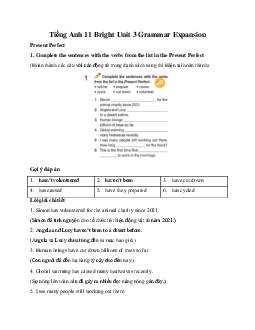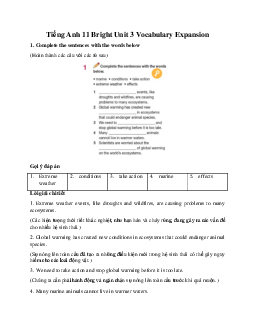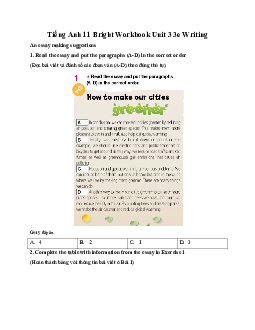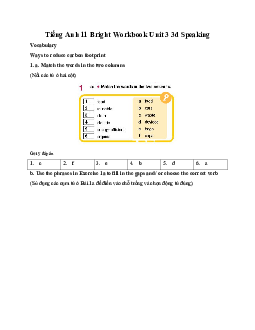





Preview text:
Bài tập Tiếng Anh 11 Bright Unit 3
A man is talking about environmental volunteering. Listen and decide if each of the
statements is T (True) or F (False)
1. Environmental volunteering has only three forms.
2. Protecting coral reefs is an example of practical environmental volunteering.
3. Everyone can work alone in community-based environmental volunteering.
4. Students who do social volunteering can educate friends about climate change.
5. Some voluntary activities are more valuable than others
Choose te word that has the underlined part pronounced differently from the others 1. A. ought B. brought C. thought D. drought 2. A. mariage B. birdcage C. damage D. village 3. A. above B. remove C. approve D. move
Circle the letter A, B, C or D to indicate the best option for each of the questions
1. Humans ______________ most of the world’s grasslands into fields of corn, wheat or other crops. A. turned B. turning C. turns D. have turned
2. The local awareness of climate change has been improved since they ______________ the campaign. A. start B. starting C. has started D. started
3. Scientists have ______________ new species in different parts of tropical areas. A. invented B. uncovered C. discovered D. caused
4. Deserts might support some wildlife, including plants and animals that can live ______________ much water. A. with B. without C. in D. under
5. ______________ change the way we grow and manage crops to reduce emissions. A. We should B. You should C. Shall we D. We shall
6. Mason: “Everyone can reduce carbon dioxide by planting trees” Tyler: “______________” A. Did they? B. Right! C. Yes, please. D. Can I?
Circle the letter A, B, C or D to indicate the word CLOSEST in meaning to the
underlined word in the question
1. Some gasses are more powerful than others in contributing to global warming. A. dangerous B. reusable C. lively D. fresh
Circle the letter A, B, C or D to indicate the word OPPOSITE in meaning to the
underlined word in the question
1. In the next century, the average gobal temperature will increase by at least 5 degrees Fahrenheit compared to 1960. A. rise B. go up C. decline D. strengthen
Read the following passage and mark the letter A, B, C, or D to indicate the correct
answer to each of the questions.
The costs and benefits of global warming will vary greatly from area to area. For
moderate climate change, the balance can be difficult to assess. But the larger the change
in climate, the more negative the consequences will become. Global warming will
probably make life harder, not easier, for most people This is mainly because we have
already built enormous infrastructure based on the climate we now have.
People in some temperate zones may benefit from milder winters, more abundant rainfall,
and expanding crop production zones. But people in other areas will suffer from
increased heat waves, coastal erosion, rising sea le more erratic rainfall, and droughts.
The crops, natural vegetation, and domesticated and wild animals (including seafood)
that sustain people in a given area may be unable to adapt to local or regional changes in
climate. The ranges of diseases and insect pests that are limited by temperature may
expand, if other environmental conditions are also favourable.
In its summary report on the impacts of climate change, the Intergovernmental Panel on
Climate Change stated, "Taken as a whole, the range of published evidence indicates that
the net damage costs of climate change are likely to be significant and to increase over time.”
1. What is the main idea of the passage?
A. Environment pollution is real.
B. Reasons why low-lying areas are flooded.
C. Solutions to global warming.
D. Reasons why global warming is a problem.
2. Which of the following is TRUE as the result of global warming?
A. All people suffer from global warming.
B. All people benefit from global warming.
C. Life is more difficult for the majority of people.
D. Life is easier for most people.
3. In paragraph 1, the word “this” refers to ____.
A. harder life as a result of global warming
B. easier life as a result of global warming
C. climate change on global scale D. flood in low-lying areas
4. In paragraph 2, the word “erratic” is closest in meaning to ____. A. predictable B. unpredictable C. changeable D. unchangeable
5. According to the passage, all of the following are the results of global warming EXCEPT ____. A. higher temperature B. coastal erosion C. increasing sea level D. stable rainfall
6. What may happen to diseases and insect pests as a result of global warming? A. They will become extinct.
B. They will increase in number.
C. They will not harm our planet.
D. They will be under good control.
Rearrrange the words or phrases to make meaningful sentences
1. of/ water/ Ponds/ are/ wide/ capable/ plants./ supporting/ of/ a/ range/
____________________________________________________________
2. natural habitats/ You/ can/ in/ see/ on/ their/ safari./ animals/
____________________________________________________________
Write the second sentence so that it has a similar meaning to the first one. Use the words in brackets.
1. Global warming has had serious impacts on cold places like Alaska. (DAMAGED)
____________________________________________________________
2. Last night, the rescue team started to save lots of animals from the wildlife. (HAS)
____________________________________________________________
3. The swamp biodiversity started being affected by human activities five years ago. (FOR)
____________________________________________________________
4. The more trees we grow, the more carbon emissions are reduce. (CUT)
____________________________________________________________
5. The local economy began to change negatively because of the decline in marine biodiversity. (SINCE)
____________________________________________________________ -The end-
Bài tập Tiếng Anh 11 Bright Unit 3
A man is talking about environmental volunteering. Listen and decide if each of the statements is T (True) or F (False) 1. F 2. T 3. F 4. T 5. F
Choose te word that has the underlined part pronounced differently from the others 1. D 2. B 3. A
Circle the letter A, B, C or D to indicate the best option for each of the questions. 1. D 2. D 3. C 4. B 5. A 6. B
Circle the letter A, B, C or D to indicate the word CLOSEST in meaning to the
underlined word in the question 1. A
Circle the letter A, B, C or D to indicate the word OPPOSITE in meaning to the
underlined word in the question 1. C
Read the following passage and mark the letter A, B, C, or D to indicate the correct answer to each of the questions. 1. D 2. C 3. A 4. B 5. D 6. B
Rearrrange the words or phrases to make meaningful sentences
1. Ponds are capabe of supporting a wide range of water plants.
2. You can see animals in their natural habitats on safari.
Write the second sentence so that it has a similar meaning to the first one. Use the words in brackets.
1. Global warming has seriously damaged cold places like Alaska.
2. The rescue team has saved lots of animals from the wildlife since last night
Since last night, the rescue team has saved lots of animals from the wildlife.
3. The swamp biodiverisity has been affected by human activities for five years.
4. The more trees we grow, the more carbon emisssions we cut down on.
5. The local economy has changed negatively since the decline in marine biodiversity.
Since the decline in marine biodiversity, the local economy has changed negatively.



